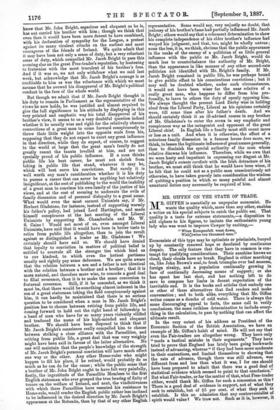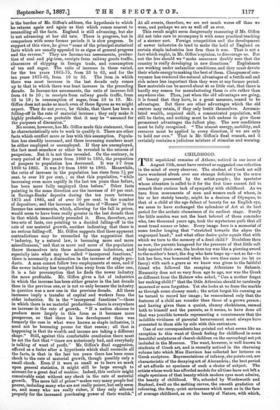MR. GIFFEN ON THE STATE OF TRADE.
MR. GIFFEN is essentially an unpopular economist. He wants the quality which, more than any other, enables a writer on his special subjects to catch the public ear. That quality is a taste for extreme statements,—a disposition to add ciphers to his figures, to imitate the enthusiastic young lady who was wont to improve Cowper by reciting,— " When Kempenfelt went down, With:twice ten thousand men."
Economists of this type may be optimists or pissimists, buoyed up by constantly renewed hope or desolated by continuous despair. The only feature that they have in common is con- tempt for qualifying considerations. Their sunshine knows no cloud, their clouds have no break. England is either marching on, like John Brown's soul, to fresh triumphs over bad seasons, foreign rivalry, and a population continually growing in face of continually decreasing means of support ; or she has spent her last shot, and has nothing left to do save to compose her limbs in decent expectation of the inevitable end. It is the books and articles that embody one or other of these alternatives that find readers and make conversation ; and to both alike, everything that Mr. Giffen writes comes as a douche of cold water. There is always the same discouraging appeal to facts, the same call to verify conclusions, the same ruthless determination to include every- thing in the calculation, to pass by nothing that can affect the ultimate result.
In the very outset of his address as President of the Economic Section of the British Association we have an example of Mr. Giffen's habit of mind. He will not say that even the Fair-traders are altogether wrong. They have only "made a tactical mistake in their arguments." They have tried to prove that England has lately been going backwards instead of advancing, whereas" if they had been more moderate in their contentions, and limited themselves to showing that the rate of advance, though there was still advance, was different from and less than what it was, I for one should have been prepared to admit that there was a good deal of statistical evidence which seemed to point to that conclusion." But what Fair-trader, or for the matter of that, what Free-trader either, would thank Mr. Giffen for such a concession as this ? There is a good deal of evidence in support, not of what they seek to establish, but of 25 per cent, of what they seek to establish. Is this an admission that any controversialist of spirit would value We trow not. Such as it is, however, it
is the burden of Mr. Giffen's address, the hypothesis to which he returns again and again as that which comes nearest to reconciling all the facts. England is still advancing, but she is not advancing at her old rate. There is progress, but in comparison with some former periods it is slow progress. In support of this view, he gives "some of the principal statistical facts which are usually appealed to as signs of general progress and the reverse." They are Income-tax assessments, produc- tion of coal and pig-iron, receipts from railway goods traffic, clearances of shipping in foreign trade, and consumption of tea and sugar. The ratio of increase in these varied, for the ten years 1865-75, from 33 to 63, and for the ten years 1875-85, from 10 to 33. The item in which there was most increase in the last decade only comes up to that in which there was least increase in the preceding decade. In Income-tax assessments, the ratio of increase fell from 44 to 10; in receipts from railway goods traffic, from 63 to 18; in consumption of sugar, from 58 to 19. Mr. Giffen does not make as much even of these figures as we might expect. They do not prove, he thinks, that there has been a falling-off in the rate of material increase ; they only make it highly probable,—so probable that it may be "assumed for the purposes of discussion."
No sooner, however, has Mr. Giffen made this statement, than he characteristically sets to work to qualify it. There are other facts which conflict more or less with this assumption. Popula- tion has steadily increased, and these increasing numbers must be either employed or unemployed. If they are unemployed, the fact must somehow or other be revealed in the returns of pauperism. Bat it is not thus revealed. On the contrary, in every period of five years from 1860 to 1885, the proportion of paupers to population has decreased. It was 41 from 1860 to 1865. It was 3-0 from 1880 to 1885. Meanwhile, the ratio of increase in the population has risen from 7 per cent, to over 10 per cent. ; so that this population, "while increasing even more rapidly in the last ten years than before, has been more fully employed than before." Other facts pointing in the same direction are the increase of 40 per cent. in Savings-Banks' deposits during the ten years between 1875 and 1885, and of over 50 per cent, in the number of depositors; and the increase in the item of "Houses" in the Income-tax assessments, which, allowing for the fall in prices, would seem to have been really greater in the last decade than in that which immediately preceded it. Here, therefore, are two sets of facts, one pointing to a decided falling-off in the rats of our material growth, another indicating that there is no serious falling-off. Mr. Giffen suggests that these apparent contradictions may be reconciled by the supposition that "industry, by a natural law, is becoming more and more miscellaneous," and that as more and more of the population throw themselves into these miscellaneous industries, and especially into what may be called "incorporeal functions," there is necessarily a diminution in the increase of staple pro- ducts. A man cannot follow two employments at once, and if the newer industry has tempted him away from the older one, it is a fair presumption that he finds the newer industry the more profitable. Mr. Giffen gives a list of industries in which the increase has been either greater in the last decade than in the previous one, or is not so only because the industry in question was a new one in the previous decade. All these increases imply a transfer of capital and workers from the older industries. So in the "incorporeal functions "—those in which there is no material production—there is everywhere an increase in the rate of growth. "If a nation chooses to produce more largely in this form as it becomes more prosperous, so that there is less development than was formerly the case in what were known as staple industries, it need not be becoming poorer for that reason ; all that is happening is that its wealth and income are taking a different shape." Still, against this comfortable conclusion there must be set the fact that "times are notoriously bad, and everybody is talking of want of profit." Mr. Giffen's final suggestion, offered as a feeler after a hypothesis which shall reconcile all the facts, is that in the last ten years there has been some cheek to the rate of material growth, though possibly only a small check. Even if it were so small as to leave no mark upon general statistics, it might still be large enough to account for a great deal of malaise. Indeed, this malaise might conceivably exist without any cheek in the rate of material growtb. The mere fall of prices" makes very many people feel poorer, including many who are not really poorer, but only seem so, and many who are really richer, if they only allowed properly for the increased purchasing power of their wealth."
At all events, therefore, we are not much worse off than we were, and perhaps we are as well off as ever.
This result might seem dangerously reassuring if Mr. Giffen did not take care to accompany it with some practical teaching of a sterner sort, Foreign -competition and the development of newer industries do tend to make the hold of England on certain staple industries less firm than it was. That is not a fact which ought, in Mr. Giffen's opinion, to discourage us. But not the less should we "make assurance doubly sure that the country is really developing in new directions." Englishmen are working under unfamiliar conditions, and they must devote their whole energy to making the best of them. Cheapnessof con- veyance has rendered the natural advantages of a fertile soil and rich mines less important than they were at any former period. Raw materials can be moved about at so little cost, that there is hardly any reason for manufacturing them in situ rather than anywhere else. Thus, just when the old advantages are going, it is found that they have, in a great measure, ceased to be advantages. But there are other advantages which the old centres may retain, if they only bestir themselves. Accumu- lated wealth, acquired skill, a concentrated population, will still be theirs, and nothing must be left undone to give these permanent advantages the fullest play. The new conditions must be fully recognised. "The utmost energy, mobility, and resource must be applied in every direction, if we are only to hold our own." That is Mr. Giffen's final remark, and it certainly contains a judicious mixture of stimulus and warning.



































 Previous page
Previous page